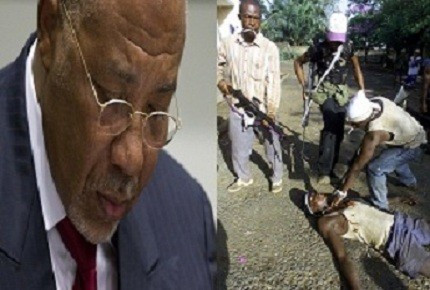Charles Taylor Convicted of Sierra Leone War Crimes

Former Liberian president Charles Taylor has been found guilty of aiding and abettingwar crimesat the Special Court for Sierra Leone in The Hague, Netherlands.
The court, which is a joint project of the United Nations and the government of Sierra Leone, was set up as part of the peace agreement which brought the country's decade-long civil war to an end in early 2002.
Taylor was indicted nine years ago and the trial began in April 2006 in Freetown, Sierra Leone, before being moved to the Hague.
The first African head of state to be brought before an international tribunal, he was charged with 11 counts of war crimes, crimes against humanity and other serious violations of international humanitarian law.
Other offences, alleged to have been committed in Sierra Leone between 1996 and 2002 under his direction, involved terrorising the population, murder, rape, the use of women and girls as sexual slaves, enforced mutilations and amputations, as well as abducting children and adults and forcing them to work as labourers or fight in the conflict in Sierra Leone.
Charles Taylor: Profile of Liberia's Warlord Turned President
Taylor, who served as president of Liberia from 2 August, 1997 until his resignation on 11 August, 2003, was accused of backing and arming the Revolutionary United Front (RUF). The rebel group fought in Sierra Leone from the end of November 1996 - the date on which the Abuja accord peace agreement was signed - until 18 January, 2002, when the Sierra Leone Civil War was officially brought to an end.
The RUF was led by warlord Foday Sankoh, who died in a Sierra Leonean prison cell while awaiting trial.
Taylor's four-year war crimes trial at The Hague has been quite controversial, marked by changes of counsel, procedural objections and delays caused by the need to accommodate the large numbers of witnesses who have been called and cross-examined by both sides.
Sierra Leoneans anxiously waited to hear the outcome of the trial. The decade-long civil war in Liberia represented the darkest chapter in the country's recent history. The extensive use of child soldiers and the brutality of attacks on civilians have also had a traumatic impact on the population.
The verdict was awaited anxiously in Taylor's native Liberia too.
The Open Justice Society will now be working in collaboration with civic organisations in Liberia and Sierra Leone to have the verdict translated into numerous local languages in a bid to make it more accessible to the population.
© Copyright IBTimes 2025. All rights reserved.





















